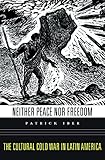Neither peace nor freedom : the cultural Cold War in Latin America / Patrick Iber.
Material type: TextPublication details: Cambridge, Massachusetts : Harvard University Press, (c)2015.Description: 1 online resource (327 pages) : illustrationsContent type:
TextPublication details: Cambridge, Massachusetts : Harvard University Press, (c)2015.Description: 1 online resource (327 pages) : illustrationsContent type: - text
- computer
- online resource
- 9780674915121
- F1414 .N458 2015
- COPYRIGHT NOT covered - Click this link to request copyright permission: https://lib.ciu.edu/copyright-request-form
| Item type | Current library | Collection | Call number | URL | Status | Date due | Barcode | |
|---|---|---|---|---|---|---|---|---|
 Online Book (LOGIN USING YOUR MY CIU LOGIN AND PASSWORD)
Online Book (LOGIN USING YOUR MY CIU LOGIN AND PASSWORD)
|
G. Allen Fleece Library ONLINE | Non-fiction | F1414.2 (Browse shelf(Opens below)) | Link to resource | Available | ocn927441751 |
Includes bibliographies and index.
Introduction -- Exile and dissent in the making of the cultural Cold War -- Making peace with repression, making repression with peace -- The Congress for Cultural Freedom and the imperialism of liberty -- The anti-communist left and the Cuban Revolution -- Peace and national liberation in the Mexican 1960s -- Modernizing cultural freedom -- Disenchantment and the end of the cultural Cold War -- Conclusion.
"This book tells the history of Latin America's cultural Cold War through an interwoven analysis of three organizations that targeted influential artists, scholars, and writers: the CIA-backed Congress for Cultural Freedom, the Soviet-aligned World Peace Council, and Cuba's Casa de las Américas. The author argues that in spite of their status as 'front' groups for the interests of the United States, the Soviet Union, and revolutionary Cuba, respectively, these organizations were both the creation of foreign interventions and of preexisting currents of the Latin American left that held a variety of conflicting views about how to bring about greater social justice. The book thus shows that even Cold War fronts could secure a measure of independence from their patrons, and that pro-democracy and egalitarian movements emerged from both the anti-Communist left and its pro-Communist counterparts. Yet each community eventually found that its sponsor's problems--those of Stalin, of the CIA, or of Fidel Castro--became its own. Rather than seeing the struggles of Latin America's left as the result of poor choices of strategy, the history of intellectuals' engagement with power shows that all available paths toward a more democratic and egalitarian Latin America required debilitating compromise, including with foreign empires. The relative lack of social democracy during Latin America's Cold War is therefore not a puzzle requiring explanation, but the predictable result of the intellectual and political problems faced by those who sought to achieve it"--
COPYRIGHT NOT covered - Click this link to request copyright permission:
There are no comments on this title.
